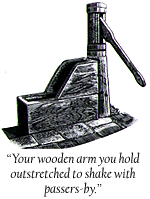Main Menu · Search · Current Issue · Contact · Archives · Centennial · Letters to the Editor · FAQs
![]()
Main Menu · Search · Current Issue · Contact · Archives · Centennial · Letters to the Editor · FAQs


Why would 29 members of the class of 1946 prefer Madonna to Peggy Lee, the sultry swinging songstress of their youth?
H. Roderick Nordell, the classmate in charge of this year's fiftieth reunion survey, admits to some doubt on this point.
Perhaps the 29 thought the questionnaire referred to the Madonna, suggested a fellow journalist who had gone to Colgate.
No, concluded Nordell: "It's because our class is not monolithic about anything, unless you count 98 percent of us saying our lives have been 'more happy than unhappy.'"
'Forty-six is not your usual Harvard class. Its ranks were sundered by World War II. The class was the first to matriculate during the war and to graduate, at least nominally, in peacetime. Of those answering the fiftieth-reunion survey, no fewer than 93 percent served in the military. Thirty-seven men died in the war. Only 28 classmates graduated on schedule. Many did not receive their degrees until 1949.
So you would scarcely expect this group to be monolithic. Yet it certainly doesn't lack for class spirit. Some 60 percent of the class's 1,064 surviving members returned the survey questionnaire, 384 came back for reunion, and the class as a whole donated an impressive reunion gift-$15,175,000-to the University Campaign.
Tabulations based on questionnaire returns portray a cohort of solid citizens: 93 percent vote in virtually every federal, state, and local election. (Only 55 percent of American voters turned out for the last presidential election.) Politically, they classify themselves as 49 percent liberal, 48 percent conservative. But 80 percent would cut Pentagon spending, and 80 percent oppose easing air and water quality regulations. Seventy-one percent would ban private possession of hand guns and assault weapons; 69 percent would end the U.S. embargo of Cuba.
The '46ers witnessed the revolutions in cybernetics and women's lib. Fifty-six percent now own computers, and 19 percent use e-mail. Only 14 percent visit the Internet. Though 76 percent have cable TV, they still like the written word: 78 percent read at least 10 books a year, and 90 percent subscribe to at least three magazines. As to working wives, 23 percent of respondents say their spouses had careers outside the home for most of their married lives.
These folks helped whelp the first wave of the baby boom generation, and survey respondents report a total of 2,818 grandchildren-"almost twice enough to replace our original freshman class," notes class report chairman Nordell. To calibrate the cultural distance between today's youth and the '46ers-who grew up in the "Gershwin-Porter-Ellington rug-cutting days, perhaps the greatest age of popular music since Mozart wrote for dancing"-Nordell included two dozen "I prefer�" pairings in his questionnaire. They reveal, inter alia, that 94 percent of classmates prefer Peggy Lee to Madonna, 93 percent prefer Fred Allen to David Letterman, 73 percent prefer meat and potatoes to Thai food, and 66 percent prefer Dizzy Dean to Roger Clemens.
Nordell, a Christian Science Monitor writer and editor for 45 years, also asked his classmates to identify the most serious crisis faced by today's world. Overpopulation ranked first, followed by "Bosnia/ethnic conflict/nationalism," moral decline, depletion of natural resources, crime, and religious extremism. What inspires the most hope for the future? Youth-"our kids." One respondent answered, "Entropy." But another observed that "there was a Renaissance in the 15th-16th Centuries."
"One of many nice things about the Class Report Office," observes Rod Nordell, "is that it aids and abets such editorial giddiness." Let it be added that for three decades the Class Report Office has been run by the durable Ann McCoubrey, who retired this year. All told, she and her small staff compiled and produced more than 300 separate reunion reports, representing at least 130,000 pages of text.
A typical volume, says McCoubrey, contains current biographical data from half to three-quarters of a class. Other classmates choose not to submit information, and at any given time, the Alumni Records Office will lack valid addresses for 10 to 15 percent of the class. A few may not mind if erroneous data appears. In tracking the suspected Unabomber, the FBI would not have been helped by the nonexistent address listed for Theodore J. Kaczynski in the last three reports of the class of '62-"788 Banchat Pesh, Khadar Kel, Afghanistan."
The log of the Harvard University Police Department, published weekly in the University Gazette, is usually a recital of trespassing incidents, disturbances of the peace, and the dispossession of bicycles, laptop computers, watches, and wallets from overly trusting or distractable members of the Harvard community. This recent entry provided a pleasing change of pace:
Screams were heard at Adams House. Units were dispatched, and upon arrival they found a person screaming for joy. The subject had been accepted to graduate school.
Primus IV
Main Menu · Search · Current Issue · Contact · Archives · Centennial · Letters to the Editor · FAQs
![]()
Harvard Magazine · 7 Ware Street · Cambridge, MA 02138 · Phone (617) 495-5746